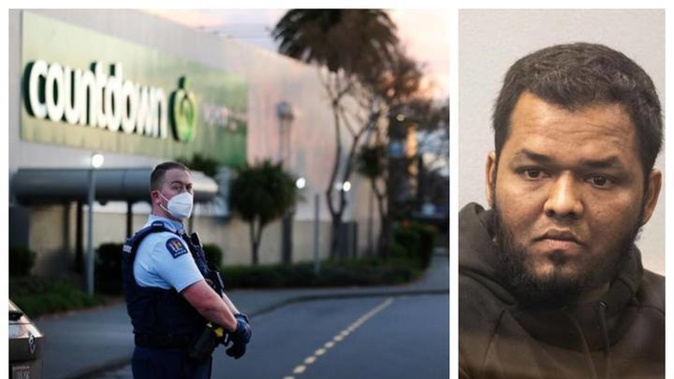
By Gill Bonnett of RNZ
Government agencies which battled to detain and deport the LynnMall attacker Mohamed Samsudeen are remaining silent on why they did not agree to his request to lose New Zealand residence.
Officials were moving to cancel Samsudeen's refugee status and detain him as a security risk, but discovered it was unlikely they could do so – or deport him.
But meanwhile Samsudeen, who claimed asylum a decade ago, asked to have his permanent residence revoked in 2018 and immigration officials twice visited him to discuss it.
Samsudeen was fatally shot in September last year by undercover police who were following him, after he stabbed shoppers at the Auckland Countdown supermarket in LynnMall.

Police and the ambulance at New Lynn countdown following a terrorist atttack in which six people were stabbed. Photo / Alex Burton
MBIE told RNZ last October Samsudeen's request was simply "not progressed."
Why it was not progressed is the subject of Official Information Act questions first put to Immigration New Zealand (INZ) more than six months ago and repeated last month.
In contrast, the Security Intelligence Service replied within two months, including 14 security intelligence reports and three terrorism threat assessments.
Its briefings elaborate on what happened at INZ: "On 25 April 2018, Mohamed Samsudeen wrote a letter to immigration New Zealand in which he stated he wanted to relinquish his New Zealand permanent residency status and his refugee status. Subsequently, in late May 2018, INZ visited [him] twice to discuss his request.
"During the first meeting Mohamed Samsudeen explained he no longer wanted the protection of New Zealand and wanted to leave the country. [He] did not engage with INZ during his second meeting."
Three weeks later, on May 16, the prime minister's office records noted she "made inquiries about individual's refugee status and deportation options."
Discussions about how Samsudeen could be detained and deported then continued until his death.
The government was quick to name him in September and detail the steps it had taken to keep the public safe – a timeline arrived in newsrooms the following day.
Conflicting advice
The email said the government followed legal advice that suggested he could not be detained as a national security risk and vowed to review the law.
But documents show it had previously had legal advice, dated May last year, that Samsudeen could be detained as a national security risk while his appeal for deportation was progressed.
INZ could then apply to a district court judge for his continued detention pursuant to a warrant of commitment pending deportation.
However, by July further advice – which has also not yet been provided to RNZ – overruled it.

Mohamed Samsudeen. Photo / File
"It was determined that the individual would qualify as a protected person under the Immigration Act," said an excerpt. "Accordingly, it was unlikely he could be deported."
Crown law said: "INZ could not exercise its power of detention of arrest and detention, pending the making of a deportation as the individual could not be detained for the purpose of deportation when that was not a realistic prospect."
"Ultimately these timelines show that Immigration New Zealand from the beginning have sought to deport this individual, and were right to do so," said Prime Minister Jacinda Ardern at the time. "This has been a frustrating process."
At the time, then-National leader Judith Collins said the attack highlighted vulnerabilities in immigration and counter-terrorism law and a public inquiry was needed to ensure accountability and transparency.
Further RNZ requests to authorities made last year – including for the original refusal of his refugee claim, his residence, deportation, cancellation of refugee status and delays to his appeals – are still outstanding.
The scope of the inquiry due to report back next month specifically excludes immigration.
Take your Radio, Podcasts and Music with you









